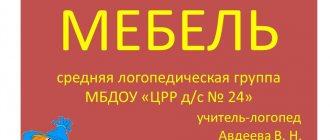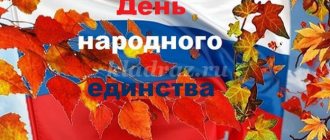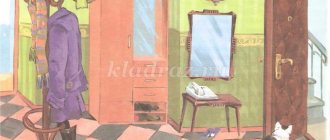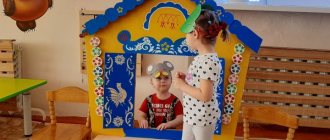Musical and sports festival “National Unity Day”
The author is Olga Alekseevna Ershova, physical education instructor at the State Budgetary Educational Institution “Kindergarten No. 91 of a combined type.”
Musical and sports festival “National Unity Day” for children of senior preschool age
Goal: Education of moral and patriotic feelings for the Motherland, for the cultural heritage of ancestors through familiarization with the holiday.
Tasks:
- Maintain interest in folk games.
- Strengthen the ability to participate in a variety of outdoor games.
- To develop in children activity, curiosity, responsiveness, and the ability to manage their behavior in a team.
The central wall is decorated according to the theme of the holiday: in the left corner there is a sun, below a bunch of tricolor balloons, in the right corner there are doves.
Children enter the hall to the music and line up to the song “We are the children of your Russia” by the music. V. Ososhnik, gr. "Wizards of the Court" After changing lanes, they sit down in their seats.
Leading:
They don’t argue with history, they live with history. It unites for feat and for work. There is one state, When the people are united, When He moves forward with great strength. He defeats the enemy, united in battle, and liberates Rus', and sacrifices himself. For the glory of those heroes, we live by the same destiny, Today we celebrate Unity Day with you.
Presenter: On November 4, all of Russia celebrates National Unity Day. It is connected with the feat of our ancestors, who rallied in the name of freedom and independence of the Motherland. This is a holiday of mutual assistance and unity.
Listen to what happened more than 400 years ago...
Russian land was occupied by enemies - the Poles. It seemed that the Russian state had perished and would never regain its former power. But the Russian people could not and did not want to accept the death of their state.
In the fall, in Nizhny Novgorod, the zemstvo elder Kuzma Minin began to gather an army to fight the enemies. One of the best military leaders of that time, Prince Dmitry Pozharsky, known for his courage and honesty, was called to command the militia.
Didactic manual to help the teacher.
For almost a whole year, the Russian people gathered their forces, and finally, the militia of Minin and Pozharsky marched on Moscow. The entire Russian land stood up against the invaders and traitors. The battles for Moscow began. And then the glorious day came: the enemy army surrendered to the mercy of the victors!
National Unity Day demonstrates the unity, heroism and cohesion of the people.
1 child: On Unity Day we will be close, We will be together forever - All the nationalities of Russia In distant villages, cities!
2nd child: Live together, work, build, sow bread, raise children, create, love and argue, protect the peace of people.
3rd child: To honor our ancestors, to remember their deeds, to avoid wars and conflicts, to fill life with happiness, to sleep under a peaceful sky!
4 child: On National Unity Day, I would like to wish throughout the whole country that the sky be peaceful, clean, and that they say: “No” to war!
5th child: So that we truly stick together, So that we respect our people, Together we escape from problems And we live like this from year to year!
2. Song “Song of Peace” lyrics.S. Bogomazova. music V. Muradeli
1st child: What do we call Motherland? The house where you and I live, And the birch trees along which We walk next to our mother.
Child 2: What do we call Motherland? A field with a thin spikelet, Our holidays and songs, A warm evening outside the window. Child 3: What do we call Motherland? Everything that we cherish in our hearts, And under the blue-blue sky, the Russian flag over the Kremlin.
3. “What do we call the Motherland?” lyrics and music by T. V. Bokach
Host: The children once asked their father: Are all Russians in Russia? We are all different, so what? We are all human, we are all alike! This means that you need to live in unity, very fun and friendly! Children are growing up everywhere in Russia, and where there are children, there is certainly play!
People of different nationalities live in Russia. Playing is a favorite pastime for many, both children and adults! With the help of games, we can get acquainted with the peculiarities of life of the peoples of other republics, because they retain their national flavor and unique gaming folklore. Folk games have a lot of humor, jokes, and competitive fervor. Today we will play games of different nations.
Didactic manual to help the teacher.
4. Russian folk game “Zarya - zaryanitsa”
Players face in a circle and hold their hands behind their backs. The driver walks in a circle behind the players saying:
Dawn - a lightning, a red maiden, Walked across the field, dropped the keys, Golden keys, blue ribbons, entwined rings, went for water!
With the last words, the driver carefully places the ribbon on the shoulder of one of the players, who, noticing this, quickly takes the ribbon, and they both run in different directions in a circle. The one who is left without a place becomes a “dawn”. The game repeats itself. Runners must not cross the circle. The players do not turn around while the driver chooses who should put the ribbon on their shoulder.
Presenter: How many of us are cheerful, different, Let's get up in a round dance again, Kindergarten is celebrating the holiday, Come out to play, people!
Did you know that the Bashkirs have always been a warlike people. Many tales and legends are associated with these people. But Bashkiria is also rich in its games.
5. Bashkir folk game “Yurta”
The game involves four subgroups of children, each of which forms a circle in the corners of the hall. In the center of each circle there is a chair on which a scarf is hung. Holding hands, everyone walks in four circles at alternating steps and sings:
We, cheerful guys, will all gather in a circle. Let's play and dance, and rush to the meadow.
To a melody without words, the guys move in alternating steps into a common circle. At the end of the music, they quickly run to their chairs, take a scarf and pull it over their heads in the form of a tent (roof), it turns out to be a yurt. Rules of the game. When the music ends, you need to quickly run to your chair and form a yurt. The first group of children to build a yurt wins.
Presenter: The next game is Tatar.
6.Tatar folk game “Tangled Horses”
The players are divided into 2 teams and line up behind the line. On the contrary, lines provide guidelines. At the signal, the first team players begin jumping, run around the landmark and run back. Then the second ones run, etc. The team that finishes the relay first wins. Rules of the game. You should jump correctly, pushing off with both feet at the same time, helping with your hands. You need to run in the indicated direction (right or left).
Host: We, friends, are not too lazy to play, Let’s braid the fence now.
7. Russian folk game “Pleten”
The players stand in ranks against the four walls of the hall, holding hands crosswise. To the music, children in opposite ranks walk towards each other and bow. They move back to their place. The movement is repeated by children in other ranks.
At the signal, the players disperse throughout the hall, performing arbitrary movements (jumping, light running, gallop, etc.). At the end of the music, everyone runs to their places and forms lines, accordingly, holding hands crosswise, the line that is the first to line up in a fence wins.
Host: And now - attention! New competitions!
We will play the Belarusian folk game “Planting Potatoes”.
8. Belarusian folk game “Planting Potatoes”.
Two teams of five people are created. The player standing first is the captain; he is holding a basket with five “potatoes” (balls). At a distance from each column there are five hoops. At the signal, the captains run to the hoops and plant one “potato” in each hoop, then return and pass the basket to the next player, who runs to collect the “potatoes,” etc.
Rules of the game. The captains start at the signal. Players do not go over the line without a basket. If the “potato” falls, you should pick it up and then run.
Host: Friends, they are always friends! You can't live a day without them! Without them we cannot overcome troubles, Without them there can be no victories! Friends, they are always friends! We cannot lose contact with them, they give us the joy of meeting, we will cherish their friendship.
Host: You guys see how many wonderful nationalities live here. Let's all unite in honor of the holiday and dance our friendly, cheerful dance.
Dance “Dance of Friends” (“Barbariki”)
1 child. Jew and Tuvan, Buryat and Udmurt, Russian, Tatar, Bashkir and Yakut. There is a big family of different nations, and we, friends, should be proud of this.
2nd child. Our common home is called Russia, Let everyone in it be comfortable. We will overcome any difficulties together. And only in unity is the strength of Russia.
3 child. Let's hold hands and stand in a circle. Every person is a friend to another. Let's hold hands, Let a huge round dance go across the Earth!
Round dance of children to the song “Big Round Dance” - music. B. Savelyeva
Presenter: Let's people, be friends with each other, Like a bird with the sky, Like grass with a meadow, Like the wind with the sea, Fields with rain. How the sun is friends with all of us!
The music of E. Zaritskaya “The Sun is Shining” sounds, the children leave the hall.





